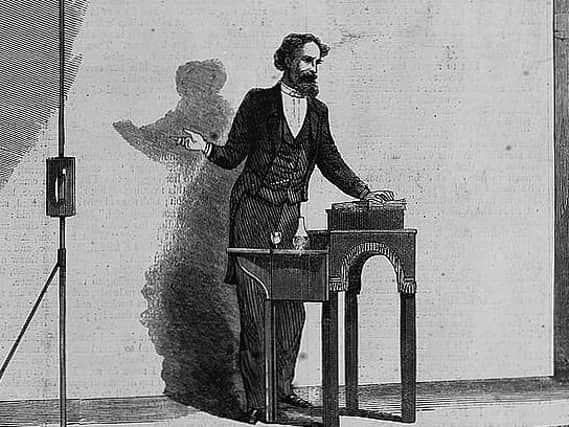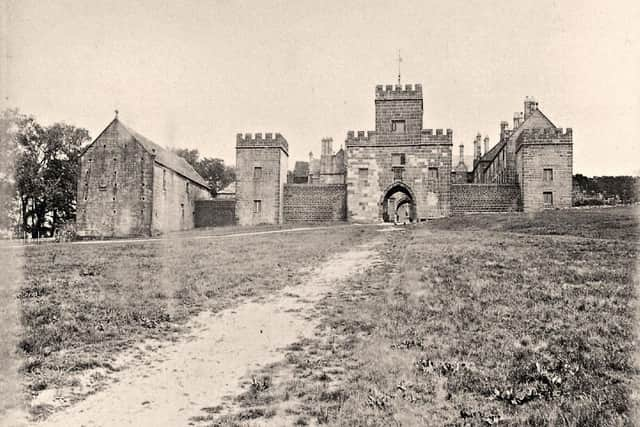When Charles Dickens visited Preston


Charles Dickens’ visit to Preston in late April 1867 was a resounding success as he enthralled the audience at a packed Theatre Royal. The dress circle, where seats sold for four shillings, was filled by many families of distinction from Preston and the neighbourhood and the Mayor of Preston was among the captivated audience. Throughout his readings, or rather recital, of ‘Doctor Marigold’ and ‘Mr Pickwick’ he did not once refer to the books before him. His skill in impersonating every character he introduced delighted the gathering. Invigorated by his performance on that Thursday night, and after a good night’s rest at the Bull Inn, he decided to walk the 12 miles to Blackburn for his Friday night recital there. Dickens, then aged 55, along with his agent George Dolby, who gave instructions for their entourage to go ahead by rail and set up the equipment, took to the highway. According to his agent there seemed little on the route to interest them, the highway lying almost entirely among the smokey factories and mills. It therefore was with some pleasure that about seven miles into their journey, they discovered, high upon elevated ground the picturesque ruins of an old mansion. A local farmer informed them it was Hoghton Tower, which at that time was falling into decay, and had a melancholy air about it. Aware of the history of the building Dickens obtained permission to roam about the place and lingered for quite some time, soaking up the atmosphere before continuing to Blackburn. Once more that evening rapturous applause greeted his recital. A few months later when Dickens was putting the finishing touches to his latest manuscript ‘George Silverman’s Explanation’, due to be published in England and the USA, he revealed his visit to Preston and Hoghton Tower had been an inspiration as he wrote his tale. The manuscript including the words, ‘My parents were in a miserable condition of life, and my infant home was a cellar in Preston. I recollect the sound of father’s Lancashire clogs on the street pavement above.’There was also references to Hoghton Tower, which was portrayed in an exaggerated fictional manner as a crumbling farmhouse building neglected by time with ceilings falling, plaster crumbling and beams and rafters strewn about the place.
Dickens first significant visit to Preston took place during the great ‘Lock Out’ which began in October 1853 as the workers attempted to have pay restored to previous levels. On the last Saturday of January 1854. Dickens, having heard of the plight of the cotton workers of Preston who had been locked out of their factories, turned up unannounced at a delegates meeting in the old Cock Pit, the former Temperance Hall, down Stoneygate to observe a union meeting. In the region of 25,000 hands had been thrown out of employment and the cry was for ‘Ten Per Cent And No Surrender’. There was much sympathy for the Preston workers and from all over Lancashire came messages of support and financial assistance. Bands of men, women and children marched through the county’s streets singing and collecting donations for the fighting fund. The following day Dickens was present at an open air meeting held on the Orchard where delegates from afar were proud to pledge money to the Preston operatives that they may continue their fight. He was clearly impressed by the comradeship of the workers and the orderly fashion in which things were conducted remarking,”Neither by night or day was there any interruption to the peace of the streets. Nor was this an accidental state of things, for the police records of the town are eloquent to the same effect... I traversed the streets very much, and was, as a stranger, the subject of a little curiosity among the idlers; but I met with no rudeness or ill temper.” On the Monday Dickens returned to the Cock Pit to see the people paid as piles of pennies were distributed to those in need. This was the time he was writing his book ‘Hard Times’ and his visit to Preston would influence that tale. His mythical ‘Coketown’ having many similarities to the Preston of those days.
Advertisement
Hide AdAdvertisement
Hide AdThe popularity of Dickens readings lead to tours in the USA, Ireland and Scotland in 1868 and 1869. After an extensive tour of Scotland towards the end of February 1869 he had occasion to board the night mail train to London along with his agent. According to Dolby, as the train approached Preston an express train going in the opposite direction passed at speed. Unfortunately, for Dickens who was sat by a partial open window the draught created by the passing train blew his favourite sealskin cap off his head and through the opposite window into the darkness. When the train halted at Preston station Dolby communicated with the station master informing him of the whereabouts of the cap and offering a reward to any plate layer or workman on the line who should find it and return it. A week later, when Dickens arrived at Liverpool, there was a parcel awaiting him at the station containing his cherished cap with the compliments of the Preston station master.


By March 1869 Dickens was once more touring England being contracted for 75 readings in town and country for more than £12,000 (equivalent to £1.3m these days) including a percentage of theatre receipts. The strain of the tour unfortunately taxed his health, which was already troubling him. Fits of dizziness and growing loss of sensation in hands and feet on his left side troubling him greatly. After a public dinner in his honour and a recital at Liverpool during the second week of April the trouble developed sharply, but he carried on. By the third Monday of April 1869 he was appearing at Blackburn where he gave another astonishing performance. With a couple of days grace before Dickens next appearances at Preston and then Warrington, his agent telegraphed the Imperial Hotel in Blackpool and booked apartments there, so they could enjoy the fresh breeze and sea air. The break seemed beneficial with Dickens appearing revived and having got his appetite back after two good nights sleep and walks on the sands. Consequently, they set off to Preston on the midday train having been telegraphed the news every ticket for the Guild Hall that night had been sold out with £200 in box office receipts. The clamour to hear his recital of ‘Oliver Twist’ being overwhelming. When the party reached the Bull Inn Dickens was handed a telegram from his physician Mr Beard saying he was very concerned about his health and was on his way from London immediately. While waiting for him to arrive Dickens and his agent spent their time supervising the setting up of the equipment in the Guild Hall, before walking down to the station to greet the doctor. After walking back to the Bull Inn Dickens underwent a strict examination at the hands of the medical man.On conclusion of the examination Beard told his agent, “If you insist on Mr Dickens taking the platform tonight, I will not guarantee that he won’t go through life dragging a foot.” Tears were rolling down Dickens’ face as the news was communicated and though he insisted he would carry on, his agent and doctor thought otherwise and they were quietly dispatched to Liverpool and the Adelphi Hotel. The time had by then turned five and the cancellation was announced, with money borrowed from Mr Byrne, the manager of the Bull Hotel, so those who did appear could be recompensed. All efforts were made to make people aware of the cancellation, even the Chief Constable James Dunn got involved sending police officers on horseback to alert folk travelling in on the country lanes of the unfortunate events.Within days Dickens was on his way to London to be examined by the great physician of the time Sir Thomas Watson. His concluded Dickens was on the brink of an attack of paralysis, and possibly apoplexy, brought on by prolonged overwork. Rest and recuperation were the aim to restore his health. Dickens struggled throughout the next year and his last book, ‘The Mystery of Edwin Drood’ was unfinished when he passed away on June 9, 1870, aged 58.